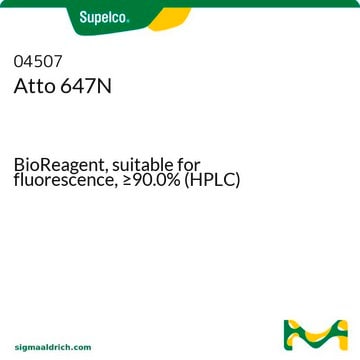05152
Atto 647N DPPE
suitable for fluorescence
Sinónimos:
1,2-Dipalmitoyl-sn-glycero-3-phosphoethanolamine labeled with Atto 647N
Iniciar sesiónpara Ver la Fijación de precios por contrato y de la organización
About This Item
UNSPSC Code:
12352108
NACRES:
NA.32
Productos recomendados
assay
≥90.0% (HPLC)
Quality Level
manufacturer/tradename
ATTO-TEC GmbH
λ
in chloroform/methanol (8:2)
UV absorption
λ: 643-649 nm Amax
suitability
suitable for fluorescence
storage temp.
−20°C
General description
Atto 647N belongs to a new generation of fluorescent labels for the red spectral region. The dye is designed for application in the area of life science, e.g. labeling of DNA, RNA or proteins. Characteristic features of the label are strong absorption, excellent fluorescence quantum yield, high photostability, excellent ozone resistance, good solubility, and very little triplet formation. Atto 647N is a cationic dye. After coupling to a substrate the dye carries a net electrical charge of +1.
In common with most Atto-labels, absorption and fluorescence are independent of pH in the range of 2 to 11, used in typical applications. As supplied Atto 647N consists of a mixture of two isomers with practically identical absorption and fluorescence properties.
Atto-Dye Labeled Phospholipids
Sigma-Aldrich offers a variety of glycero-phospholipids carrying one or two fatty acid groups (lipophilic groups) and a phosphate ester residue (hydrophilic group). They are labeled at the hydrophilic head group. After incorporation of the phospholipid into a membrane the fluorophore is located at the water/lipid interface of the membrane. We currently provide 1,2-dipalmitoyl-sn-glycero-3-phosphoethanolamine (DPPE), 1,2-dioleoyl-sn-glycero-3-phosphoethanolamine (DOPE), palmitoyl-sn-glycero-phosphoethanolamine (PPE), and 1,2-dimyristoyl-sn-glycero-3-phospho-ethanolamine (DMPE) labeled with Atto-dyes.
find more information here
In common with most Atto-labels, absorption and fluorescence are independent of pH in the range of 2 to 11, used in typical applications. As supplied Atto 647N consists of a mixture of two isomers with practically identical absorption and fluorescence properties.
Atto-Dye Labeled Phospholipids
Sigma-Aldrich offers a variety of glycero-phospholipids carrying one or two fatty acid groups (lipophilic groups) and a phosphate ester residue (hydrophilic group). They are labeled at the hydrophilic head group. After incorporation of the phospholipid into a membrane the fluorophore is located at the water/lipid interface of the membrane. We currently provide 1,2-dipalmitoyl-sn-glycero-3-phosphoethanolamine (DPPE), 1,2-dioleoyl-sn-glycero-3-phosphoethanolamine (DOPE), palmitoyl-sn-glycero-phosphoethanolamine (PPE), and 1,2-dimyristoyl-sn-glycero-3-phospho-ethanolamine (DMPE) labeled with Atto-dyes.
find more information here
Legal Information
This product is for Research use only. In case of intended commercialization, please contact the IP-holder (ATTO-TEC GmbH, Germany) for licensing.
Storage Class
11 - Combustible Solids
wgk_germany
WGK 3
flash_point_f
Not applicable
flash_point_c
Not applicable
Certificados de análisis (COA)
Busque Certificados de análisis (COA) introduciendo el número de lote del producto. Los números de lote se encuentran en la etiqueta del producto después de las palabras «Lot» o «Batch»
¿Ya tiene este producto?
Encuentre la documentación para los productos que ha comprado recientemente en la Biblioteca de documentos.
Nanoscale organization of nicotinic aceylcholine receptors by stimulated emission depletion microscopy.
Kellner, R.R., et al.
Neuroscience, 144(1), 135-143 (2007)
Fluorescence lifetime imaging with pulsed diode laser enabled stimulated emission.
Ge, J.; Kuang, C.; Lee, SS.; Kao, FJ
Optics Express, 20(27), 28216-28216 (2012)
Direct observation of the nanoscale dynamics of membrane lipids in a living cell. Nature.
Eggeling, C.; et al.
Nature, 457, 1159-1162 (2009)
STED nanoscopy. A glimpse into the future.
Bianchini, P.; et al.
Cell and Tissue Research, 360(1), 143-150 (2015)
Fluoreszierende Rhodamine und fluorogene Carbopyronine fur die STED-Mikroskopie lebender Zellen.
Butkevich, Alexey N.; et al.
Angewandte Chemie (International Edition in English), 128(10), 3350-3355 (2016)
Nuestro equipo de científicos tiene experiencia en todas las áreas de investigación: Ciencias de la vida, Ciencia de los materiales, Síntesis química, Cromatografía, Analítica y muchas otras.
Póngase en contacto con el Servicio técnico



